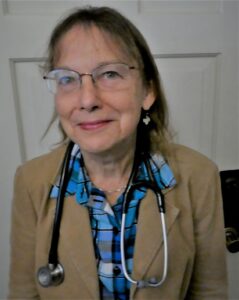Covid-19: Opinion Piece
Names have been altered for reasons of confidentiality.
When the lockdown began I started calling my patients who were booked to see me, and also others whom I thought might be in crisis because of the situation.
This was how I learned that living with decades of post traumatic stress disorder (many of my patients are refugees who fled to Canada in the 1980s and 90s from Latin America’s civil strife) can equip some to withstand such storms as the one we are in.
Previously chastised by their children for avoiding anxiety-provoking outings, Maria and Patricia announced serenely that they were fine, thank you very much, reading, sewing, doing exercise routines alone, protecting themselves from too much disturbing news. They had no desire to risk going out shopping, and so were grateful to their children who made weekly food drop-offs.
Blanca has a daughter back home with advanced cancer. She used to return twice a year to visit Paula, rocked each time by her emaciation, blood pressure sky-rocketing on her return, Now she calls every day and encourages Paula from this safe distance, still intimately involved in her life, still the nurturing mother.
Adam, an unemployed young adult with social anxiety disorder, normally encamped in his bedroom in front of his computer, is relieved by the absence of pressure to go out. He has started helping out his harried working parents around the house.
But Georgina cannot go to Peru to relieve her sister who supports their 95 year old mother who is caregiver to their paraplegic brother. She hears the stories of food riots, of people dying from the pandemic, no one to visit or claim their bodies. Georgina herself is on disability for a chronic pain condition and was always much the worse for wear after these caregiving visits. And Ahmad cannot return to France for the funeral of his late mother’s brother and sister-in-law, who died of covid. He lives alone here, no family, fragile mental health, sleeping two hours a night for months on end, gaunt and agitated.
For people living on or close to the street here in Toronto, it has been a mixed bag. Colette, a pensioner who survived the terrors of residential school in the North, was so anxious at first that she was convinced every symptom she had was covid-19; thankfully, all her tests have been negative. Before covid, her abusive ex had occupied her apartment, so she left for a shelter – from which she was evicted when it closed due to covid risks.But she was re-located to a re-purposed hotel, where she is living with the privacy and dignity that are her due. Sixty year old Frank , who assuages his extreme anxiety with alcohol, was in a men’s shelter which terrified him, when he came down with covid. Mercifully, he did not get very ill – but he did get placed in a hotel with his own room, and a worker to check up on him, and for a time he stopped drinking and thrived.
But there is an even deadlier pandemic within the pandemic – the opioid crisis. In the two Toronto Community Housing buildings at Warden and St Clair where we have an interprofessional team of physician, nurse and social worker, there have been 8 deaths from overdoses in the past 3 months – and none from covid. The urgent and necessary message to “do your part, stay apart” to avoid viral contagion, is the polar opposite of what desperate substance users need – “Never use alone”. Locked alone in their room, they are found some hours or days later, dead of an overdose, unable to get help to come in time, if they were aware they needed it. We do not hear the stories of their last hours, their last minutes; there is no-one to bear witness.
Bearing witness is what I feel called to do. These are cruel times, all over the globe.
I am grateful to my patients for these glimpses into their lives, their suffering but also the compassion they lavish on their loved ones.
I have much to learn.
Dr. Jane Pritchard
I completed my residency in Family Medicine at Queens University in 1975. I learned a lot about poverty and injustice in Bangladesh in the early 1980s, lived in Australia for 12 years and returned to Canada in 1987. Since then I have been in family practice in Toronto, with a focus on refugees and those living with homelessness.
I find myself contemplating the intersection of individual human rights and mutual responsibility which is our world today.
All opinions expressed here are those of the author and do not necessarily reflect the official policy or opinion of the deVeber Institute.


